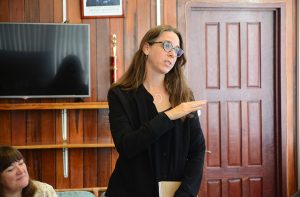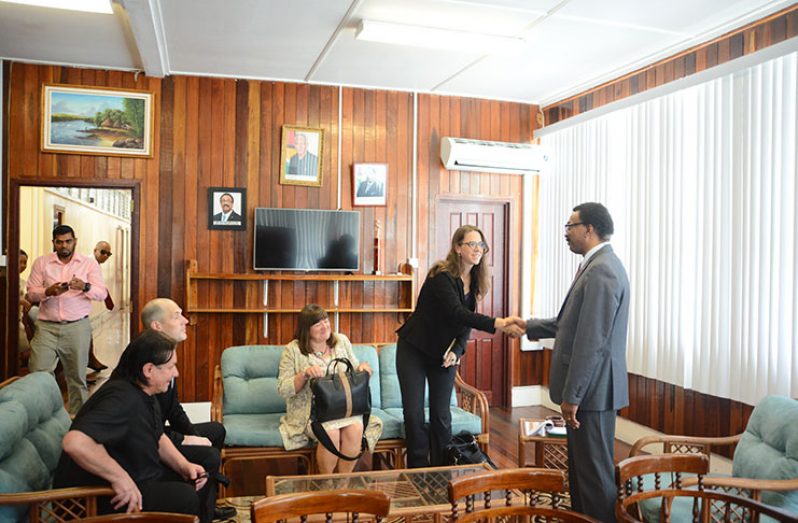…raises concern over CJ ruling on overseas-based Guyanese on voters list
THE issue of overseas voting in the General and Regional Elections was once again brought to the fore on Wednesday morning, when Attorney General and Minister of Legal Affairs Basil Williams met with representatives of the United States-based Carter Center.
The meeting with the four-member team addressed a range of issues, including the legislation engendered by former U.S. President Jimmy Carter which ended overseas voting here. AG Williams said it was under the Election Laws Amendment Act Number 3 of 1991, that the legislation was put forward.
“[The law] provided that only citizens in embassies and High Commissions and their families could vote and they buttress that position by the constitutional amendment Act number 4 of 1991… they did a lot of work,” the AG told the media following the two-hour meeting.
The team was shown the Constitutional Reform Report, often utilised by the courts, which specifies the requirement of residents to be in Guyana at the time for elections. “So, only citizens resident in Guyana could vote in Guyana and the Constitutional Reform Commission Act, 18 persons (of 21) voted in favour for only persons resident in Guyana must vote in the elections, so the law is very clear,” he said.
Williams alluded to the law as he explained his government’s displeasure with the recent High Court ruling which stated that names of persons should not be removed from the list. Government has since appealed the ruling. The attorney general said while the issue was not argued before the Acting Chief Justice, Roxane George-Wiltshire in the recent challenge to house-to-house registration, yet she ruled on the matter. “If you are saying that people who have registered prior and are abroad are still eligible to vote, even though they did not take part in the compilation by house-to-house [registration] of a new register by being resident in a division in Guyana, we have to show that by the Carter intervention overseas voting was outlawed.”
Government’s appeal

In setting out grounds for the appeal, the attorney-general had told the appellate court that the learned trial judge erred and was misconceived in law when she ruled that Article 159 (5) of the Constitution which addressed ‘the qualifying date’ is only applicable to persons 14 years or older for the purpose of registration as at October 31, and not all Guyanese citizens. According to him, the chief justice (ag) failed to apply any cannons of interpretation in arriving at her decision, adding that the matter was already fully ventilated and argued before the Caribbean Court of Justice (CCJ), and as such, was, therefore, res judicata.
The acting chief justice, while validating the house-to-house registration exercise, had ruled that it would be unlawful or unconstitutional to remove the names of persons who are already on the List of Registrants and who were not, or have not been, or are not registered in the current exercise with a consequence of non-inclusion in the list of electors. George-Wiltshire had explained that persons could only be removed from the list if they are deceased or disqualified pursuant to Article 159. In her judgement, Justice George-Wiltshire also ruled that residency in the case of Guyanese was not a requirement under the laws; but the Attorney-General, in his application, contended that the chief justice again erred.
“The learned trial judge erred and was misconceived in law in finding that there is no law or laws in Guyana which set out additional requirements, more particularly, residence for purposes of Article 159 (2) ( c ) of the Constitution by failing to properly address her mind to Section 6 of the National Registration Act, Chapter 19:08 of the Laws of Guyana. The learned trial judge erred and was misconceived in law in failing to properly construe Section 6 of the National Registration Act, Chapter 19:08 Laws of Guyana in order to find that residency is a requirement of the Act for the purpose of registration during the period of the ‘ qualifying date,’” the attorney-general contended.
He, therefore, suggested to the appellate court that it would not be unconstitutional to remove persons from the list who had previously been on the list, but were not registered during the house-to-house registration period because of non-residency in Guyana.
Further to that, the attorney-general alleged that the learned trial judge breached the separation of powers doctrine, contending that the Parliament clearly provided in Section 6 of the National Registration Act, Chapter 19:08 Laws of Guyana for residency during house-to-house registration. “The learned trial judge erred and was misconceived in law where, from the evidence, nothing established that there was a breach of the provisions of the Constitution, the National Registration Act or any other law, but the evidence was consistent with the fact that GECOM acted in accordance with Article 159 (2) ( c ) 159 ( 5) and 162 of the Constitution of Guyana; the learned trial judge erred and was misconceived in law when she breached the separation of powers doctrine by purporting to issue instructions to GECOM, a constitutional, independent actor to not remove persons who are presently registered from the current National Register of Registrants (NRR), but who are not registered under new house-to-house registration from the current National Register of Registrants (NRR),” the attorney-general submitted to the court.

On those bases, Minister Williams further submitted to the Court of Appeal that Chief Justice (ag) George-Wiltshire misdirected herself in law by failing to assess and address the importance and relevance of the provisions of the National Registration (Amendment) Act in the process of compiling a new National Register of Registrants. It is his belief that contrary to the ruling of the High Court, the provisions of the National Registration Act (NRA) and the Elections Laws (Amendment) Act ought not to be read together in the creation of a new National Register of Registrants. According to him, the Elections Laws Amendment Act applies to an existing register and not the creation of a new National Register of Registrants under the National Registration Act Chapter 19:08.
“The learned trial judge erred and misdirected herself in law when it was not proper for her to rule on the issue of persons being removed from the list because it was not an order specifically claimed or sought by the Applicant; and the learned trial judge erred in law and/or misdirected herself on the evidence as a whole,” the attorney-general said, as he summed up his arguments in the notice of appeal. He is, therefore, asking the court to set aside or reverse the judgement of the learned trial judge based on the grounds laid out.
Other issues
Among the other issues addressed were the government’s interest in credible elections, the legal situation of the country and the state of Parliament, the Executive, the Judiciary and the Guyana Elections Commission (GECOM).
The Carter Center’s Brett Lacy said the team’s meeting with the attorney general provided the opportunity to hear about Guyana’s laws and the arguments relating to circumstances in the country. She said her team is in Guyana only to meet with and listen to the various actors. The team will meet with other teams throughout its one-week stay in Guyana.
“We are very happy to have this opportunity to hear from different perspectives. I can say from the Carter Center that we are really here just to listen and we are hoping to meet with different actors to understand everyone’s perspective on the current events in Guyana,” She explained. Earlier this year representatives of the Carter Center had met with Williams.




.png)









